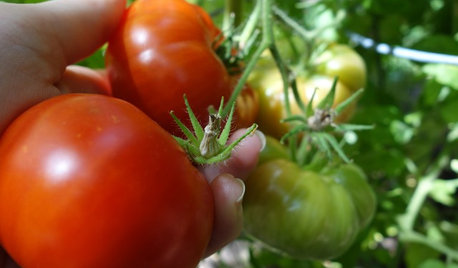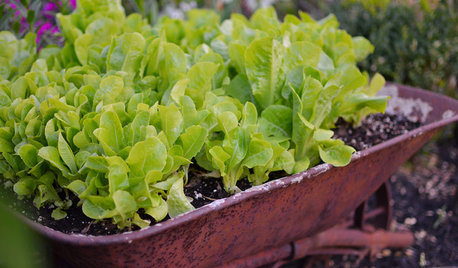Freeze or Can tomatoes?
I have been reading in other threads that many people freeze their tomatoes. I have never had the ambition to buy the supplies and do any canning. Plus I grow indeterminates because I want a continuous supply of tomatoes rather than one large harvest. But IF I get enough at once to can, is there any difference in the taste and quality of product you get from canning vs. freezing? If you could do either, which would you do? I might try buying just half a dozen quart jars and see what happens. I am a little afraid of all those good tomatoes spoiling if I don't do it right, though.
Sue
Comments (76)
Seysonn_ 8a-NC/HZ-7
7 years agoFor canning max pH has to be 4.2. That is what most tomatoes are. In the absence of a pH meter a table spoon of vinegar per quart should be enough to lower the pH to safe range. A small amount of vinegar ( 5% acidity with pH of 2.4 ) can go a long way, to bring pH down.
Sey
Labradors
7 years agoOddly enough, they say to use double the amount of vinegar than you would use lemon juice for canning. I can never find citric acid in the stores that sell "all your canning needs" and the pharmacy only has one pound bags of it which would last forever. Beats me, so I use lemon juice (and apple cider vinegar if I run out of that).
Linda
Related Professionals
Kyle Landscape Architects & Landscape Designers · Roxbury Crossing Landscape Architects & Landscape Designers · Gainesville Landscape Contractors · Broadlands Landscape Contractors · Fuquay-Varina Landscape Contractors · Holland Landscape Contractors · Mount Sinai Landscape Contractors · National City Landscape Contractors · Palatine Landscape Contractors · Pikesville Landscape Contractors · Watertown Landscape Contractors · Aurora General Contractors · Big Lake General Contractors · Gary General Contractors · Provo Decks, Patios & Outdoor Enclosuresdigdirt2
7 years agoMax pH is 4.6 rather than 4.2 and most tomatoes fall into the 4.6 range +/-0.4 range.
"To ensure safe acidity in whole, crushed, or juiced tomatoes, add two tablespoons of bottled lemon juice or 1/2 teaspoon of citric acid per quart of tomatoes. For pints, use one tablespoon bottled lemon juice or 1/4 teaspoon citric acid. Acid can be added directly to the jars before filling with product. Add sugar to offset acid taste, if desired. Four tablespoons of a 5 percent acidity vinegar per quart may be used instead of lemon juice or citric acid. However, vinegar may cause undesirable flavor changes."
http://nchfp.uga.edu/how/can_03/tomato_intro.html
USDA - Acidifying Tomatoes When CanningDave
Seysonn_ 8a-NC/HZ-7
7 years agoLabradors(Kingston, ON) Oddly enough, they say to use double the amount of vinegar than you would use lemon juice for canning
.............................
I wonder why ?
Lemon juice and household vinegar have roughly the same pH/acidity.
Then I know that the food safety organizations add almost 300% safety factor in their guidelines. For example , ONE TBS of vinegar in plain water ( assume pH =7) will result in pH of under 3.5. Lets say you start with a tomato that has a pH of 5 then you won't even need one TBS of vinegar to reduce its pH to 4. A little acid can go a long way in bringing the pH down. JMO
SEy
digdirt2
7 years agoAccording to the USDA bottled lemon juice is almost 2x as acidic as the standard 5% commercial vinegar. Plus unlike fresh lemon juice, it is a stabilized pH. Vinegar often isn't, which is what allows the mother to grow in it over time.
The reason, as often discussed on the Harvest forum, is because most water - both city and well - has a pH well above 7 and because pH is a not stable in canned goods. It rises over time in storage so you need a margin of protection.
Of course one can always choose to ignore the tested guidelines and accept the risk associated with the unknown.
Dave
gorbelly
7 years agolast modified: 7 years agoYes, lemon juice is much more acidic than vinegar. They both tend to be in the 2s on the pH scale, but there's a big difference between low (lemon juice) and high (vinegar) 2s.
Seysonn_ 8a-NC/HZ-7
7 years agopH of 5% household distilled vinegar is exactly 2.41 . ( 5% acetic acid , 95% water). Cider vinegar has lower acidity.
Here what they have on internet :
Apple cider vinegar: 3.10 ( ???.)
White distilled vinegar: 2.40 – 3.40
Lemon Juice (fresh): 2.00 – 2.60
Lime Juice (fresh): 2.00 – 2.35.
John A
7 years agoThe way to solve this discussion is to make sauce and freeze it. I use tomatoes, peppers, basil, garlic, oregano, and thyme in mine. I keep it pretty chunky.
John A
digdirt2
7 years agolast modified: 7 years agopH scale is logarithmic. Differences are x10. Do the math on the difference between a pH of 2.0 and one of 3.0 (3.0 is 10x more alkaline) or 2.0 and 4.0 (4.0 is 100x more alkaline).
You want to argue with basic principles of math and chemistry that is your choice.
Dave
Seysonn_ 8a-NC/HZ-7
7 years agoI know my math and the principle of pH.
Take pure distilled water. Its pH will be 7. What that means is that it is neither acidic nor alkaline, It is neutral. Now add acid to it it will become acidic. Add alkaline to it it will be alkaline. Acidity and aklalinity cannot coexist. They neutralize each other. The net effect will be either acidic or alkaline.
In any given solution with pH under 7 only the amount of acid varies. So in canning the amount of acid should be high enough so that no bacteria can exist and/or produce spur. So when the guideline says pH of 4.6 is minimum. That is the minimum acidity. Now , it is possible that in certain canning material there might exist some hidden alkaline than has not been fully neutralized. But that does not apply to tomatoes, me thinks.
Sey
gorbelly
7 years agolast modified: 7 years agoYou can, of course, do what you want. But things like density of food/particle size, storage conditions of canned food, etc. can cause pH to rise. There are microorganisms that like living in acid environments and do not harm us directly which raise food pH and can give something harmful like C. botulinum a foothold. In addition, just because vinegar or bottled lemon juice claims to be a certain concentration doesn't mean it always is. And acidity of tomatoes--especially paste tomatoes, ironically--can get pretty high depending on the time of season, how they're ripened, how ripe they are, whether they are blemished, etc. etc. You seem pretty sure that all there is to it is whether or not there is "some hidden alkaline", whereas the biological and chemical picture is certain to be much more complex than that. Like I said, you can certainly take chances if you feel confident that you know everything you need to know to judge. As for me, because following guidelines poses no risk to me and minimal inconvenience and because it's highly unlikely that what I preserve will be eaten only by me alone, and because, despite being a pretty smart person and having a wide body of knowledge, I'm not actually an expert in food preservation, I follow the guidelines. Sure, it may take a "perfect storm" to make food unsafe if you use only 1 tbsp of lemon juice per quart as opposed to 2, but perfect storms do happen, and avoiding one happening in my canned tomatoes is easy and of no risk to me.
digdirt2
7 years ago"Acidity and aklalinity cannot coexist."
Of course they can. The pH scale is a measurement scale just like any other method of measurement. It measures both at the same time. When something is less acidic then it is also more alkaline.
No one uses distilled water in canning but the only way to create distilled water with an actual pH of 7.0 is in a lab in a fully enclosed system. Once it is exposed to the air it immediately absorbs CO2 from the air and shifts to the more acidic (less neutral) side of the scale.
Dave
rgreen48
7 years agolast modified: 7 years agoOkay, I freeze, but when I do, I accept that flavor is a little compromised. Why? Well cold temperatures affect the chemical reactions and production of volatile compounds. Flavors are inextricably linked to these volatile chemicals. However, blanching, and high temperatures also negatively affect volatile compounds. Link.
Why freeze? For me, it's an energy-use issue. I already have the freezer running, so why not? Canning requires heat production when ambient summer temps are high. Freezing tomatoes whole (I rinse, core, and remove damaged spots before freezing) makes skin removal easy, and doesn't require boiling water (a foodmill is a good investment, and when making sauce or soup, also removes the energy-intensive, boiling water/skin removal step.)
Freezing whole allows me to make my sauce during the colder days when cooking helps heat the house.
Why do canned tomatoes sometimes taster 'fresher'? Most likely because the added acid necessary for canning preservation 'wakes up' flavor. Lots of dishes taste 'fresher', or 'perkier' with a splash of lemon juice or vinegar.
I'm not going to get involved in the discussion over the types of acid used, or the pH values (suffice to say that if it were me, I'd just use an acid powder like citric. I bought tartaric acid for my winemaking from Amazon, and really, these days, everything is available to everyone.)
Unless you're going for a specific flavor profile with the vinegar or lemon juice, powdered acids, like lemon and vinegar also, do bring a 'sour' note, but they have far fewer actual 'flavors' of their own than vinegars and lemon, are usually much easier to measure out, and are far more consistent.
So, for me, freezing, and no additions of acid, is the most efficient method at this time. Gotta say though, someday an investment in canning might be desired. Can't beat it for storage space, and 'shelf-life'.
gorbelly
7 years agoBoiling water canning is very easy to do. I was intimidated for many years and resisted doing it, but when faced with the choice of buying another chest freezer and learning to can last year, I took the plunge. I actually found it very fun. The only extra equipment aside from jars and lids I needed to purchase was a jar lifter. Everything else (a large stock pot, a cake rack to keep the jars off the bottom, funnels, etc.) I had already. Very economical, especially if you can retrieve jars and rings from relatives you give away goods to. This year, I'm putting away tons of pickled goods. I usually prefer lactofermented pickles in various forms (I especially like experimenting with different kinds of kimchi), but there's a limit to how long those will last, even in the fridge.
aruzinsky
7 years agoNot much difference in taste but raw nutrition is better. If you put raw tomato juice in a polyethylene bottle, slightly under filled to allow for expansion, you can freeze it almost forever without changing the flavor. And, chest freezers are cheap.
gorbelly
7 years agolast modified: 7 years agoaruzinsky: raw nutrition is better
A blanket statement that is very frequently untrue. It depends on which nutrients you're after and what foods you're talking about. Many of the nutrients that are destroyed by cooking are easy to come by in other forms. Many nutrients that are harder to come by only become available after cooking or processing in some way.
The lycopene in tomatoes, for example.
aruzinsky
7 years ago"The lycopene in tomatoes, for example."
Lycopene content is unaffected by cooking. But, only when cooked with oil, it is more easily absorbed by people. If you are going to make oily pasta sauce, it doesn't matter whether the tomatoes are precooked or not.
aruzinsky
7 years ago"Acidity and aklalinity cannot coexist."
Of course they can. The pH scale is a measurement scale just like any other method of measurement."
Wrong. Acidity is below 7.0, alkalinity is above 7.0 and neutral is 7.0. A pH value cannot simultaneously be above and below 7.0.
gorbelly
7 years agolast modified: 7 years agoaruzinsky: Lycopene content is unaffected by cooking.
Nobody said anything about amount. We're talking about availability to the human body.
But, only when cooked with oil, it is more easily absorbed by people.
Most people use fats when cooking unless they're on weird fringe diets. "Cooked with oil" is still "cooked", no? In other words, not "raw nutrition". And absorption is not all there is to availability, although they often overlap and are often related to one another.
If you are going to make oily pasta sauce, it doesn't matter whether the tomatoes are precooked or not.
That is incorrect also. The changes to lycopene that render it into a more human-bioavailable and more beneficial form requires heat, i.e., cooking. The presence of fat allows for absorption of that altered lycopene (fats are required for optimal absorption of many nutrients).
gorbelly
7 years agolast modified: 7 years agoOf course, eating raw tomatoes is perfectly fine. It's pleasurable, if the tomato is good, delicious, and very good for you. You will, for example, get more vitamin C from the tomato that way, as the heat of cooking will destroy much of the vitamin C. But you won't get the same benefits from other nutrients that you would get if you eat them cooked.
I merely point out that aruzinsky's statement "raw nutrition is better" is a blanket statement that is frequently untrue. Optimal nutrition is usually a matter of balance and variety, which includes eating foods in many forms: raw and preserved and cooked in various ways, etc.
rgreen48
7 years agoI used to be a 'raw foods' enthusiast. To a large degree, I still am. However, I have learned that heat helps some nutrients become 'better available' to the body. From my present understanding, I eat both raw and cooked foods. If I boil or steam veggies though, I always drink the liquid as a tea.
aruzinsky
7 years agolast modified: 7 years ago"If you are going to make oily pasta sauce, it doesn't matter whether the tomatoes are precooked or not.
That is incorrect also. The changes to lycopene that render it into a more human-bioavailable and more beneficial form requires heat, i.e., cooking. The presence of fat allows for absorption of that altered lycopene (fats are required for optimal absorption of many nutrients)."
"Precooked" implies it is cooked twice therefore my statement is correct.
And,
fat
noun
1. a natural oily or greasy substance occurring in animal bodies, especially when deposited as a layer under the skin or around certain organs.
Heated fat is an oil.
gorbelly
7 years agoYou are the one who fixated on oil. Which is an error of scope, since it's not just oil but fats in general.
And if something is "precooked", how can it be "raw nutrition"? You make no sense.
aruzinsky
7 years agolast modified: 7 years ago"Which is an error of scope, since it's not just oil but fats in general."
Your error. All rendered fats are oils but not all oils are fats.
"And if something is "precooked", how can it be "raw nutrition"? You make no sense."
It's not. "Precooked" refers to your pasteurized tomatoes in mason jars. If there is no oil, the lycopene isn't absorbed any better than raw. And, freezing raw tomatoes doesn't prevent you from cooking them with oil later.
"The changes to lycopene that render it into a more human-bioavailable and more beneficial form requires heat, i.e., cooking. The presence of fat allows for absorption of that altered lycopene (fats are required for optimal absorption of many nutrients)."
There are no changes to lycopene. It just dissolves in the oil which later is emulsified by bile which is absorbed in the small intestines. Heat increases the rate of dissolution but it is not necessary. Given enough time, the same amount of lycopene will dissolve in oil at room temperature.
"Many nutrients that are harder to come by only become available after cooking or processing in some way."
Since you said "many," name three more.
gorbelly
7 years agoaruzinsky, I m glad you admit your error. Yes, the more accurate term would be "fats", not just oils. I'm surprised, since you normally are incapable of ever admitting that you're wrong.
aruzinsky: Since you said "many," name three more.
Important carotenoids would more than satisfy your demands: lutein, beta-carotenes,zeaxanthin, for example. Many antioxidants like ferulic acid. Indole is created in many vegetables from cooking. Proteins become more easily digested when cooked, and studies have shown that cooked meat provides more energy than uncooked. Many nutrients in things like bones or woody or hard parts of plants cannot be extracted for human consumption unless cooked. The caloric value of lmost all foods increases when cooked, which has been important for human survival during times of scarcity and famine.
There is plenty of evidence that cooking preceded and was a prerequisite for our final stages of evolution into H. sapiens and that we are, as a species, adapted to cooked foods. Of course, in this age of food excess in the developed world, we can certainly survive on all-raw food if we want. But that doesn't mean "raw nutrition is best". As I said, variety is the key to optimum nutrition. If you want to get the most out of your vegetables, eat them raw AND cooked. Eat them exclusively one way or the other, and you lose out.
aruzinsky
7 years agolast modified: 7 years ago"aruzinsky, I m glad you admit your error. Yes, the more accurate term would be "fats", not just oils. I'm surprised, since you normally are incapable of ever admitting that you're wrong."
You are wrong. I am not wrong. What part of "all rendered fats are oils" didn't you understand? Vegetable oils works as well as fats for dissolving lycopene thereby facilitating absorption. Your suggestion that only fat can be used is unhealthy.
gorbelly
7 years agoaruzinsky: You are wrong. I am not wrong. What part of "all rendered fats are oils" didn't you understand? Vegetable oils works as well as fats for dissolving lycopene thereby facilitating absorption. Your suggestion that only fat can be used is unhealthy.
You think "fat" only means fat from animals because you you cut and paste whatever came up first in Google? You have a lot to learn about both chemical and culinary definitions and usages of the word "fat". But perhaps English is not your native language.
All oils are fats. Not all fats are oils. Therefore, using the more inclusive "fats" is most accurate. Whether or not you've been brainwashed by decades of anti-saturated-fat dogma to think that fats that are solid at room temperature are unhealthy or have chosen to keep yourself informed about the errors of past government dietary recommendations, the fact is that saturated fats do the same work of aiding absorption of nutrients as polyunsaturated fats.
aruzinksy: I meant nutrients in tomatoes.
Why? What argument does that win you except the new one in which you suddenly moved the goalposts because you can't stand to be wrong?
Since the major thing that makes tomatoes uniquely valuable nutritionally is their carotenoid content, in particular their lycopene content, and since those nutrients become more bioavailable through cooking, any reasonable person would find that good enough reason to eat tomatoes cooked in addition to raw to most fully take advantage of what they offer in terms of health benefits.
Whether you personally are reasonable or want to derive optimal nutritional benefits from your tomatoes is something only you care about.
aruzinsky
7 years agolast modified: 7 years ago"All oils are fats. Not all fats are oils."
Wrong. Mineral oil is not a fat.
That is not to say that by "oily pasta sauce" I was suggesting any kind of oil. Within the context of this thread and forum, I shouldn't have to explain that I meant edible oil.
"aruzinksy: I meant nutrients in tomatoes.
Why? What argument does that win you except the new one in which you suddenly moved the goalposts because you can't stand to be wrong?"
Because this thread is titled, "Freeze or Can Tomatoes." You used this thread as an opportunity to verbosely pontificate about irrelevancies because you like to talk too much. You started by wrongly accusing me of a "blanket statement". "Raw nutrition (of tomatoes) is better" is not a wrong within the context of this thread. Canning tomatoes without oil decreases overall nutritional value, unless you can name a nutrient in tomatoes that is practically improved WITHOUT adding oil.
"since those nutrients become more bioavailable through cooking"
Without adding oil, your statement is false. People do not normally add oil to canned tomatoes.
aruzinsky
7 years agoHere's an irrelevant but not verbose fun fact. Lycopene is more soluble in ethyl acetate than oil.
And, ethyl acetate is slightly edible. It is used in flavorings and has an oral-rat LD50 5620 mg/kg.
gorbelly
7 years agolast modified: 7 years agoaruzinsky: Wrong. Mineral oil is not a fat.
LOL. Uh, OK, you win, if you think taking the scope of your "argument" to ridiculous places in order to do so makes you a "winner". I mean, I thought it was obviously that we were speaking of culinary fats, but I guess I cannot assume common sense with you. Of course, I could easily follow you and point out that you urged people to put oils and not fats in their tomato sauce, and since petroleum-based oils are oils, you don't care whether they poison themselves. That would be just as reasonable as the path down which you're now taking your ridiculous resentment-based argument.
Canning tomatoes without oil decreases overall nutritional value, unless you can name a nutrient in tomatoes that is practically improved WITHOUT adding oil.
"since those nutrients become more bioavailable through cooking"
Without adding oil, your statement is false. People do not normally add oil to canned tomatoes.
You must have truly weird food habits if you subsist entirely on tomatoes straight out of the can with no additional preparation and no other foods. Normal people end up preparing the tomatoes with some kind of culinary (<- since it seems you need this kind of clarification) fats or eating them with other foods that contain fats (<- I will clarify that this includes culinary oils, since you appear to need this kind of clarification).
At any rate to maximize the benefits of lycopenes and other carotenoids in tomatoes requires both heat AND fats. However, cooking without fats still increases the bioavailability of lycopene by altering its orientation, so it's still better than raw and certainly no worse if your primary nutritional concern with tomatoes is to get the benefits of lycopenes. If you are looking to tomatoes and only tomatoes for all your nutritional requirements, I guess you're out of luck, but in that case, your diet is so bizarre that this is the least of your concerns.
aruzinsky
7 years ago"since petroleum-based oils are oils, you don't care whether they poison themselves.
Mineral oil is used is used to treat constipation and, in your case, you would benefit.
"However, cooking without fats still increases the bioavailability of lycopene by altering its orientation, so it's still better than raw and certainly no worse if your primary nutritional concern with tomatoes is to get the benefits of lycopenes."
According to this, fat is necessary for production of cis-isomer:
http://researchnews.osu.edu/archive/lycoproc.htm
note, "Heat is essential to the process, but so is adding some fat, Schwartz said."
gorbelly
7 years agolast modified: 7 years agoaruzinsky: Mineral oil is used is used to treat constipation and, in your case, you would benefit.
So you ARE recommending people add mineral oil to their tomatoes and that this will aid absorption of nutrients? And all oils, including all other petroleum-based oils? That's a very... unwise and dangerous recommendation.
According to this, fat is necessary for production of cis-isomer[...]
I guess you don't know enough about reading science journalism to know that you always have to read the actual paper because journalists routinely oversimplify, extrapolate, or otherwise dress up scientific findings, and scientists often talk up extraneous aspects of their work in order to make it more entertaining and interesting to laypeople. In the actual experiment:
."The second sauce, rich in lycopene
cis-isomers (sauce B; 55 % all-trans-lycopene), was
obtained by applying the same procedure to the same
tomato juice concentrate followed by further processing in a
steriotort at 127C for 40 min."In other words, the only variable that was tested was at how high a temperature and how long the sauce was cooked. Fat content was not what was studied. Its effects on serum lycopene is speculation--well-grounded speculation based on evidence established elsewhere, but still not directly dealt with in the study in question.
As I've already said, heat + fat is optimal for both aspects of carotenoid bioavailability, i.e., nutrients taking forms that can more easily be used by human metabolic processes and absorption of those nutrients into the human body. Fat alone isn't going to do it. Heat alone will do more than fat alone, but ideally you should have both heat and fat for best bioavailibility.
For those of us like me who really just like both raw and cooked tomatoes for the pleasure of eating them that way, it's a bonus to know that nutrition is not being lost by eating them cooked sometimes but that it helps us to fully balance the different benefits that tomatoes have to offer in both cooked and raw forms.
Suzi AKA DesertDance So CA Zone 9b
7 years agoI boil mine for a minute to remove the skins. I whirl them in the bullet. Then I cook them down until they are nice red tomato sauce. Then I freeze them in one cup zip baggies for use in recipes.
Suzi AKA DesertDance So CA Zone 9b
7 years agogorbelly, this is a really good tip! Roast them first! I like it! I do grow paste tomatoes.. San Marzanos, but roasting could give them a really nice flavor.
aruzinsky
7 years ago"So you ARE recommending people add mineral oil to their tomatoes and that this will aid absorption of nutrients? "
No, ONLY you, and not because it will aid in absorption of nutrients.
aruzinsky
7 years ago"have to read the actual paper because journalists routinely oversimplify, extrapolate, or otherwise dress up scientific findings, and scientists often talk up extraneous aspects of their work in order to make it more entertaining and interesting to laypeople. "
Thanks Gorbelly. I note the following:
We have 5% cis versus 45% cis isomer sausce. Increasing cis- isomers 800% in the sauce only increased blood content by 54%. Considering that you can get that by eating 54% more of 5% cis sauce, the extra heating is not worth the effort. And, I suspect adding 45% more cooking oil to the 5% cis sauce and eating the same amount would also work just as well. And, this suggests that 0% cis, 100% trans-isomer sauce would be almost as well absorbed as the 5% cis, 95% tans-isomer sauce.
" boil mine for a minute to remove the skins."
I believe that most of the lycopene is in the skins, but, you will have to check me on this.
Labradors
7 years agoI laughed out loud at your last paragraph, but it seems you are right:
from: http://www.whfoods.com/genpage.php?tname=foodspice&dbid=44
" Whenever possible, try to develop recipes that make use of the whole tomato. We've seen research showing higher lycopene content in whole tomato products. For example, when the skins of tomatoes are included in the making of the tomato paste, the lycopene and beta-carotene content of the paste is significant higher according to research studies."
Linda
gorbelly
7 years agolast modified: 7 years agoaruzinsky: No, ONLY you, and not because it will aid in absorption of nutrients.
So first, you insist it must be OILS, not fats. And I point out that oils are a subset of fats and that whether one uses fats classified as oils or fats, they provide the necessary lipids to aid absorption (wrongly assuming that it will be clear to you that we are talking about culinary fats). And then you point out that mineral oil is an OIL, not a fat. And yet I am the one suggesting people should cook with mineral oil? And now you're making jokes about constipation, as though such childish lashing out is actually going to bother me. LOL. OK. Keep going. It gets ever more entertaining to watch you wildly flip-flop like a dying fish to always be right, which ironically proves the opposite more often than not.
aruzinsky: We have 5% cis versus 45% cis isomer sausce. Increasing cis- isomers 800% in the sauce only increased blood content by 54%. Considering that you can get that by eating 54% more of 5% cis sauce, the extra heating is not worth the effort.
You're assuming the relationships are linear. There is no evidence of that, and things are almost never linear when it comes to biology.
aruzinsky: And, I suspect adding 45% more cooking oil to the 5% cis sauce and eating the same amount would also work just as well.
"I suspect"? Based on what, besides wishful thinking?
aruzinsky: And, this suggests that 0% cis, 100% trans-isomer sauce would be almost as well absorbed as the 5% cis, 95% tans-isomer sauce.
"It suggests". "I suspect". Once again, this is based on no evidence. But it's important to point out that the tomatoes processed at lower temps are still cooked for much less time and/or at lower temperatures than home cooking. Once again, you're working on the assumption that eating canned tomatoes straight out of the can is something anyone besides you does on a regular basis. For most of us who can tomatoes, it goes through lengthy cooking, either before or after it goes into the canning jars, and people who use store-bought canned tomatoes most often subject it to further cooking. For people who broil, roast, or grill tomatoes, the tomatoes get exposed to much, much higher heat, and, as the skins are left on usually and are on the outside, the nutrient-rich skins get exposed to much higher heat.
aruzinsky: I believe that most of the lycopene is in the skins, but, you will have to check me on this.
You're actually correct on this one. In general, skins of vegetables and fruits are where a lot of micronutrients are located. If one is cooking with the explicit purpose of getting at those nutritients, it's best, if one has to make a vegetable recipe in which skins are absent from the final product, to try to leave the skins in as long as possible in the cooking process or save them and extract remaining nutrients in broth/tea/soup/etc. I do it primarily for flavor and because I don't like to waste, but traditional foodways are almost always evolved to extract maximum nutrition from available foods, and stock made from trimmings and peelings have a time-honored place in most cuisines not disrupted by industrial food processing. In the case of tomatoes, a tomato stock made from the seeds and skins is a great ingredient to have on hand in the kitchen, especially when cooking for vegetarians. I try to keep some frozen in cubes, but sometimes, I just like to drink it like consomme.
aruzinsky
7 years agolast modified: 7 years ago" I point out that oils are a subset of fats and that whether one uses fats classified as oils or fats"
You are still wrong because vegetable oils include substances besides dietary fats, e.g., fatty acids, waxes and long chain alcohols.
" For most of us who can tomatoes, it goes through lengthy cooking, either before or after it goes into the canning jars"
Not at 260 deg. F..
"this is based on no evidence."
There is also no evidence that cis-lycopene is necessary for substantial absorption of lycopene.
gorbelly
7 years agoaruzinsky: You are still wrong because vegetable oils include substances besides dietary fats, e.g., fatty acids, waxes and long chain alcohols.
By your definition, no fats, whether vegetable oil or animal fat, is considered fat. You think fats derived from animals have no fatty acids (boggles the mind) or long chain alcohols? I honestly don't know whether culinary animal fats contain waxes--I would think some have trace amounts, since animals do produce waxes--but good luck taking olive oil and separating out and cooking with only the waxes in it. And, hey, if you do that, doesn't that cease to become oil and just become wax? And since wax is not an oil, if a vegetable oil contains wax, then it's not an oil anymore by your own ridiculous logic. So, congratulations--you have had to render all of these terms meaningless and remove all stable definitions from them and make them mean only what is convenient to you at any given second in order to not be wrong, LOL.
aruzinsky: Not at 260 deg. F..
Your oven doesn't go over 260F? You've never used tomatoes in recipes that call for them to roast or caramelize in any way?
Not to mention that there has been work done discussing how tomatoes react to cooking times. They offer improved antioxidant benefits when cooked longer, even at a modest 88C: http://ucanr.edu/datastoreFiles/608-418.pdf
aruzinsky: There is also no evidence that cis-lycopene is necessary for substantial absorption of lycopene.
"Substantial" is meaningless. What is "substantial"? What is not meaningless is that we know cis-lycopene is much better absorbed and we know of at least one mechanism behind that superior absorption.
But if you want to insist against reason that trans-lycopene is just as good, my previously linked Cornell study shows that amounts of trans-lycopene actually increase when tomatoes are cooked, even at a modest 88C, and the effect is greatest at a modest 15 minutes cooking time (as cooking time increases further, cis-lycopene increases while trans-lycopene decreases, although it stays at levels above raw tomatoes).
aruzinsky
7 years ago"By your definition, no fats, whether vegetable oil or animal fat, is considered fat. You think fats derived from animals have no fatty acids (boggles the mind) or long chain alcohols? I honestly don't know whether culinary animal fats contain waxes--I would think some have trace amounts, since animals do produce waxes--but good luck taking olive oil and separating out and cooking with only the waxes in it. And, hey, if you do that, doesn't that cease to become oil and just become wax? And since wax is not an oil, if a vegetable oil contains wax, then it's not an oil anymore by your own ridiculous logic. So, congratulations--you have had to render all of these terms meaningless and remove all stable definitions from them and make them mean only what is convenient to you at any given second in order to not be wrong, LOL."
Wrong and too verbose.
" What is not meaningless is that we know cis-lycopene is much better absorbed and we know of at least one mechanism behind that superior absorption."
In this juice study, the lycopene is not dissolved in oil and therefore does not reflect on the previous study of oily pasta sauce. We need a study comparing absorption of cis versus trans isomers that are completely dissolved in cooking oil at body temperature. I have not seen such a study. And, researchers also speculate that in the oily sauce case, the different absorption rates are controlled by solubility in oil, in which case, more oil (maybe, 55% more oil) would increase absorption of trans-lycopene to that of cis-lycopene.
And, since the color of tomatoes are unspecified by the OP, we may as well be talking about freezing tangerine tomatoes, in which case, no cooking is necessary for getting cis-isomers.
gorbelly
7 years agolast modified: 7 years agoaruzinsky: Wrong and too verbose.
I can only assume from this weak response that you are either not capable of understanding what I said or have no response because you realize that you're wrong.
aruzinsky: In this juice study, the lycopene is not dissolved in oil
Oil was part of the meals.
As for the rest of it, if you want to continue to move the goalposts because you can't stand not being right, then there's no more point in engaging with you. All I can say is that it should be evident to any reasonable person that the common-sense conclusion from what we know is that raw-only is a short-sighted philosophy when it comes to tomatoes.
If someone wants to grow only tangerine tomatoes and only eat them in the form of raw, fine overly oily puree because all their gardening and dietary choices are motivated by some kind of raw foodist orthorexia, then they are welcome to have such a joyless relationship to their food.
As for the rest of us, it's clear that tomatoes should be eaten how we like them prepared, since the important thing is to enjoy growing them them and eating them, and, if we're looking for optimal nutrition from them, the evidence overwhelmingly favors eating them in both raw and cooked forms to get the most out of them. This agrees with how most people who grow tomatoes eat tomatoes, finding as many fresh uses for them as possible in season so we can savor their raw flavor and texture when it's at its best, and preserving and cooking the ones we can't eat fast enough or laying them by for a taste of summer in the winter, when we most often cook the tomatoes we've put aside.
aruzinsky
7 years agolast modified: 7 years agoSuit yourself. I have better things to do than address your overly verbose babble.
gorbelly
7 years agolast modified: 7 years agoaruzinsky: Suit yourself. I have better things to do than address your overly verbose babble.
I suspect making enough oily raw tangerine tomato slurry to survive on is very time-consuming and living on it alone leaves one cognitively disadvantaged.
Peter (6b SE NY)
7 years agoThough it seems like someone is just trolling, I'd say basing how you cook your tomatoes (or don't), based solely on your interpretation of some scientific articles you found online, should qualify as some kind of mental disorder. Tomatoes are healthy, any way you eat them (unless you suffer from GERD and they are a trigger). There is nothing wrong with eating raw foods if that is what you enjoy and it makes you feel good, but if you become obsessed and won't eat cooked tomatoes or other foods because you believe they aren't healthy enough for you, then you have a problem.

















gorbelly